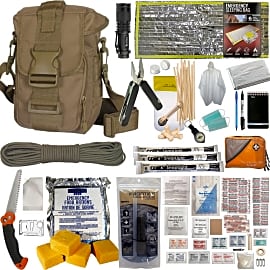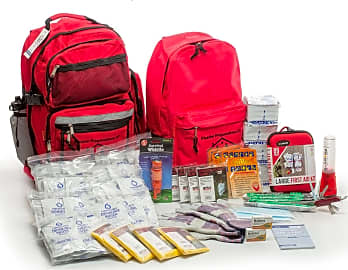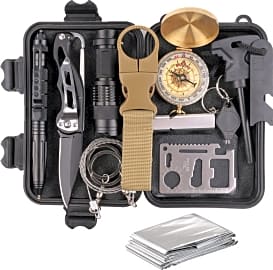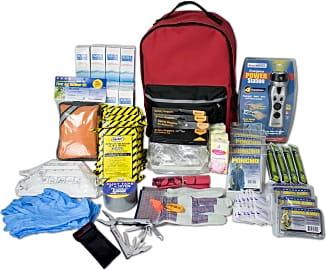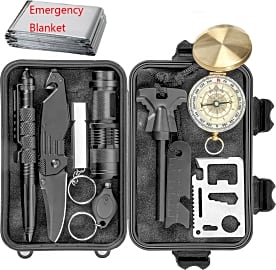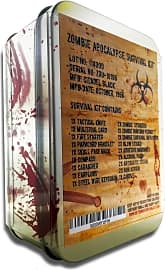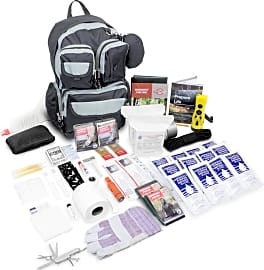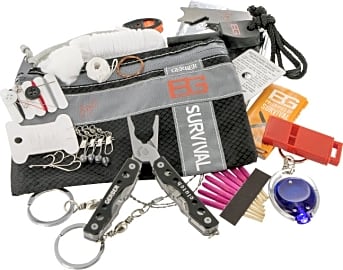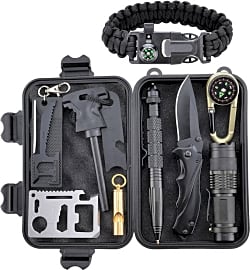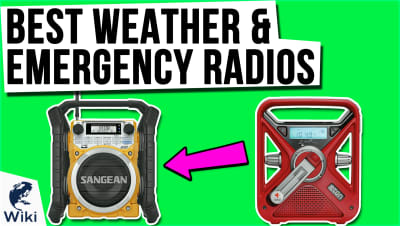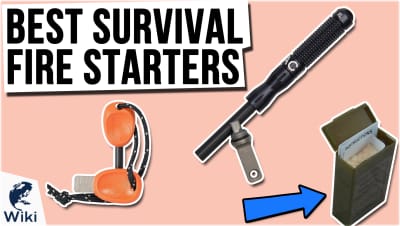The 10 Best Survival Kits

This wiki has been updated 32 times since it was first published in January of 2018. You never know what Mother Nature might throw at you, and being prepared could mean the difference between life and death in the event of an emergency. These survival kits contain the crucial items you need to stay alive until help arrives, including medical supplies, tools, and food. Some even arrive with water. You'll be ready when the grid goes down — or when the zombies take the city. When users buy our independently chosen editorial choices, we may earn commissions to help fund the Wiki.
Editor's Notes
June 11, 2019:
Some folks will tell you that you can buy everything you need without having to invest in a pre-made survival kit, but the fact is, you're probably (A) busy and (B) not a survival expert. You most likely want something you can put in your closet/car and hope you never have to use. These survival kits are exactly that. Depending on the one you select, you may want to upgrade a few items, but this isn't necessarily a bad thing. Keep the spare around as a backup. In fact, it's generally a good idea to build some slack into your preparedness system, which means having more than one way of providing/obtaining food, water, shelter, fire, and so on. Always remember the prepper's mantra: two is one and one is none.
With that said, we still think the Sustain Supply Co. Premium, Prepper's Favorite Get-Home, and First My Family are all workable options. The selection from Sustain is especially useful, since it includes prepackaged water, a filtration system, and a portable stove, should the former two fail and you must boil water. It also has thoughtful backups for illumination. The Prepper's Favorite has a filtration straw, but no prepackaged water, while the First My Family has prepackaged water, but no filtration system — so you may need to supplement these. But they have a much more comfortable price tag than the Sustain option, so if you're strapped for cash, they should work just fine.
Special Honors
The Prepster Black by Preppi For discerning individuals who demand luxury, even in a crisis, there's The Prepster Black by Preppi. Its price tag may be a bit of a shock, but it does have high-end gear that most options do not include, such as a solar panel, night vision scope, and even a fancy chocolate bar. preppi.co
OpticsPlanet Z.E.R.O. From the selection of items, you might think that the OpticsPlanet Z.E.R.O. is made for going to war, not surviving a "run-of-the-mill" weather emergency. Considering what the name stands for — Zombie Extermination, Research and Operations — this may just be true. It features a stunning array of high-quality gear, for a price that only the truly serious will want to pay. opticsplanet.com
The Seventy2 Survival System You may have seen The Seventy2 Survival System pitched on Shark Tank, and now it's ready to move from TV into your home. Designed expressly to keep you alive for the first critical 72 hours of a crisis, it has a more robust backpack than most kits, one with an integrated emergency whistle and flashlight mounts. unchartedsupplyco.com
Why You Should Own A Survival Kit
A virus that turns millions of people into flesh-eating, brain-dead zombies.
A hurricane or earthquake that wipes out an entire city. A political disagreement that sparks all-out nuclear war. A virus that turns millions of people into flesh-eating, brain-dead zombies. In today's chaotic world, is there any end to the list of potential catastrophes that might befall human society and bring on the end of civilization as we know it?
According to modern doomsday preppers, probably not. Part of a wider culture of survivalism, these paranoid and proactive individuals see each new technological advancement or social instability as a potential harbinger of the apocalypse, the final event that sends civilization hurtling back to some primitive state in which it's everyone for themselves. To ensure their survival during that inevitability, many will doomsday fanatics to great lengths to stockpile food, guns, and other equipment today.
And, contrary to popular belief, doomsday prepping is no longer just a fringe movement. The precariousness of our present age has led to an explosion in its popularity in recent years, giving rise to a whole cottage industry surrounding long-term personal survival. Many companies now specialize exclusively in doomsday prep gear, including prepackaged bug-out bags, non-perishable food stuffs, and even private bunkers where you can wait out the radioactive fallout.
Of course, you don't have to believe the end is nigh to invest in a basic survival kit. Armageddon aside, there are plenty of ordinary reasons to keep a few essential medical and emergency items around for the unexpected. Car accidents and power blackouts are both routine events that call for a host of gear that will be included in your typical survival kit, such as a flashlight and space blanket. In less routine, but still common situations, like extended trips in back-country wildernesses or disaster-prone regions, other equipment will be even more essential, including water purification tablets and emergency rations. Whatever the scenario, a good survival kit will have most everything you need to stay alive for a few days or even weeks before help arrives.
Anatomy Of A Survival Kit
When shopping for a survival kit, a lot depends on how you plan to use it. Not every option needs to be as comprehensive as those amassed by hardcore doomsday preppers, and for the most typical situations, a basic 32- or 72-hour kit will suffice. There are, however, a few key items that any proper kit should contain.
Multi-purpose tools, emergency blankets, compasses, and firestarters are also all vital.
Clean water is one such item, and any kit should either come with containers of liquid H20 or else a means to purify whatever water supply is available. Iodine tablets, UV pens, and hand or gravity operated filtration systems all offer different ways to turn dirty water into the potable kind, though not all are created equal, and which to include in your kit will depend largely on weight and location considerations. Food is another obvious necessity, and many kits will include anywhere from a few hours to a few days worth of it, either in freeze-dried, canned, or even powered form. How much you'll need will again depend on the situation — as a general rule of thumb, experts recommend a three-day supply of food during natural disaster evacuations, and two-week supply if you're waiting it out at home.
Other items are aimed at increasing your chances of survival after those basic needs are met. A flashlight with extra batteries is important, as the power grid is often the first luxury to go during a catastrophe. For the same reason, it's also a good idea to have a hand-crank radio, which will help you keep track of weather and emergency alerts. A first-aid kit is another essential piece of your overall package, since injuries are likely to happen during a disaster and you'll want a sterile way to treat them. Multi-purpose tools, emergency blankets, compasses, and firestarters are also all vital.
But even if your survival kit comes with all of this, you may want to think about adding a few things of your own. Extra cash, maps of your home area, and copies of identification documents will all come in handy as you flee affected regions. You should also include any personal hygiene or medical items, such as tampons, eyeglasses, and pet and baby supplies. In general, you'll want to tailor your survival kit to your and your family's own specific needs.
Other Emergency Preparedness Measures
Investing in a survival kit is a good first step towards fortifying you and your family against the unexpected. But it's by no means an exhaustive solution, and there are many other measures you can take to stay prepared for an emergency situation.
From a general point of view, it's important to have a plan in place to deal with emergencies before they arise.
From a general point of view, it's important to have a plan in place to deal with emergencies before they arise. That includes identifying which events are most likely to occur in your area, such as floods or wildfires, and knowing which authorities to contact when they happen. It also includes discussing with your family and household members the appropriate response to them, as well as pre-assigning responsibilities to avoid confusion at the onset.
You may also want to invest in other preparedness kits. In many disaster situations, your vehicle will serve as your ticket out of danger, so it's a good idea to keep an emergency road kit in your trunk. And even if your survival kit already includes several first aid components, you'll likely want to have a more comprehensive supply around, especially if you're caring for a whole family.
Of course, if you're ready to go full doomsday prepper, there's really no limit to the steps you might take to protect yourself in the end times.


